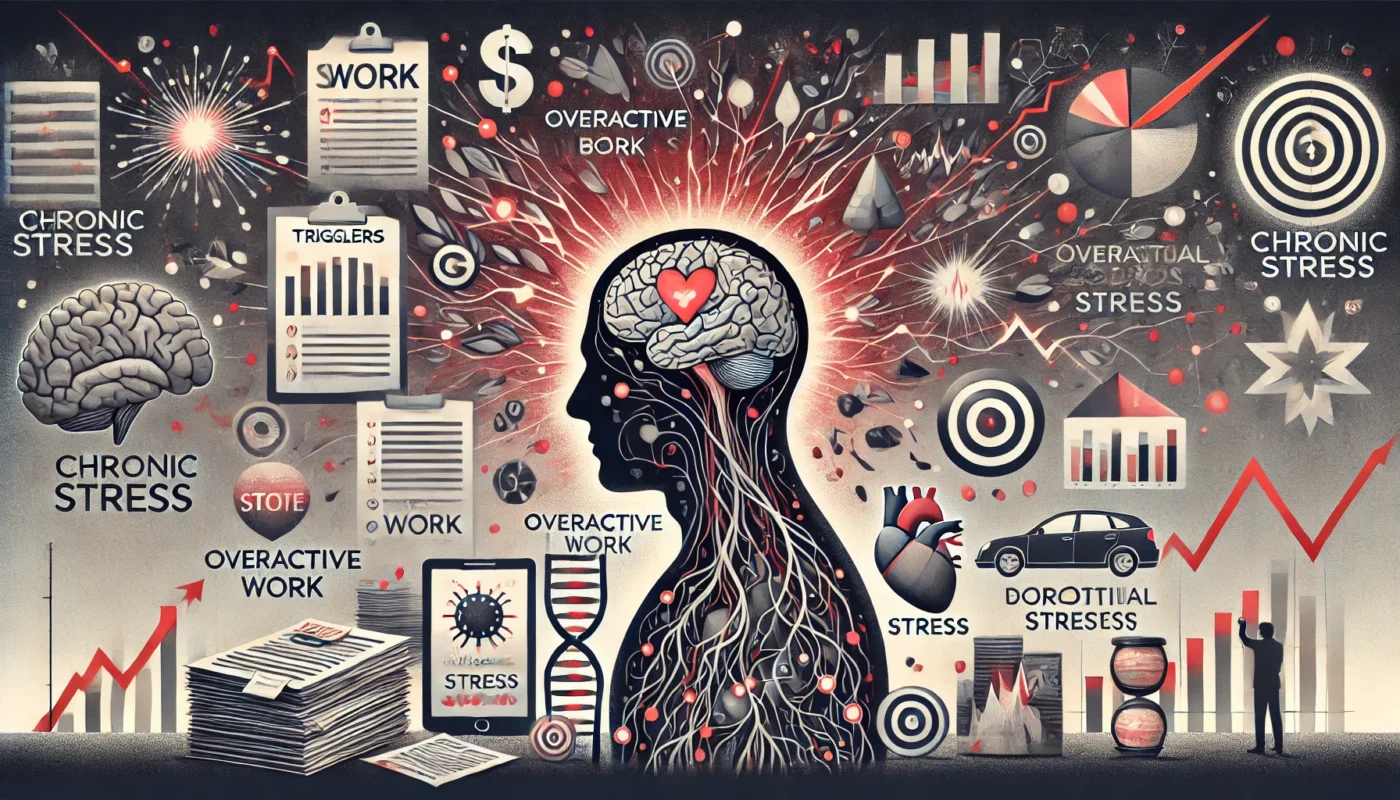Chronic stress is an enduring state of physiological and emotional tension caused by prolonged exposure to stressors that disrupt homeostasis. Unlike acute stress, which is temporary and often resolved quickly, chronic stress persists, contributing to physical, emotional, and psychological imbalances. This article will delve into the complexities of chronic stress, including its symptoms, causes, treatment options, prevention strategies, and the role of nutritional supplementation in supporting stress relief.
You May Also Like:
What is Chronic Stress?
Chronic stress arises when the body’s stress response remains activated over an extended period. The stress response, or the “fight-or-flight” mechanism, is an evolutionary adaptation that prepares the body to face immediate threats. While helpful in acute situations, its prolonged activation can negatively impact nearly every system in the body, including the cardiovascular, endocrine, and immune systems.
According to the American Psychological Association, chronic stress has become a widespread concern, with 75% of adults in the United States reporting moderate to high stress levels in their daily lives. Prolonged stress is linked to several chronic diseases, including hypertension, diabetes, and depression, making its management essential for long-term health.

Symptoms of Chronic Stress
The symptoms of chronic stress are multifaceted and can manifest physically, emotionally, and behaviorally. Common symptoms include:
Physical Symptoms
- Fatigue
- Headaches
- Gastrointestinal disturbances, such as irritable bowel syndrome (IBS)
- Muscle tension or pain
- Insomnia or disrupted sleep patterns
- Weakened immune response, leading to frequent illness
Emotional Symptoms
- Anxiety or feelings of unease
- Irritability or mood swings
- Feelings of helplessness or hopelessness
- Difficulty concentrating or memory problems
Behavioral Symptoms
- Increased use of alcohol, tobacco, or drugs
- Withdrawal from social interactions
- Overeating or loss of appetite
- Decreased productivity or performance
Chronic stress not only reduces quality of life but also exacerbates existing health conditions, such as cardiovascular disease and autoimmune disorders.
Causes of Chronic Stress
Chronic stress results from a combination of external pressures and individual susceptibility. Common causes include:
1. Work-Related Stress
Excessive workloads, tight deadlines, and workplace conflicts contribute significantly to chronic stress. A 2018 study in the Journal of Occupational Health Psychology found that high job demands and lack of support increase the risk of stress-related disorders.
2. Financial Strain
Economic instability, debt, and concerns about future financial security are major sources of chronic stress for many individuals.
3. Personal Relationships
Family conflicts, divorce, and caregiving responsibilities can lead to prolonged emotional distress.
4. Health Problems
Living with chronic illness or caring for someone with a debilitating condition adds another layer of persistent stress.
5. Environmental Stressors
Exposure to noise, overcrowding, and unsafe living conditions can create a baseline of ongoing stress.
6. Traumatic Events
Experiencing or witnessing trauma, such as abuse, violence, or natural disasters, can result in chronic stress if not addressed.

Treatment Options for Chronic Stress Recovery
Effective treatment for chronic stress focuses on reducing stress levels, managing symptoms, and improving coping mechanisms. The following approaches are commonly used:
1. Psychotherapy
Cognitive-behavioral therapy (CBT) and other counseling techniques help individuals identify stressors, develop coping strategies, and challenge negative thought patterns. A randomized controlled trial published in Behavioral Therapy (2020) demonstrated that CBT significantly reduced anxiety and stress levels in participants.
2. Mindfulness and Relaxation Techniques
Practices such as meditation, deep breathing, and progressive muscle relaxation help calm the nervous system. A 2019 study in Mindfulness found that participants who practiced mindfulness meditation for eight weeks reported lower levels of perceived stress.
3. Physical Activity
Regular exercise reduces cortisol levels and releases endorphins, which improve mood. A study published in the Journal of Sports Medicine (2021) indicated that moderate aerobic exercise three times a week significantly reduced stress biomarkers in participants.
4. Adequate Sleep
Improving sleep hygiene and addressing sleep disorders are crucial for stress recovery. Sleep-deprived individuals are more susceptible to stress, as reported in a 2020 study in Sleep Health.
Nutritional Supplementation for Chronic Stress Relief
Nutritional supplements can help mitigate the effects of chronic stress by addressing deficiencies, reducing inflammation, and supporting neurotransmitter balance. The following supplements are particularly beneficial:
1. Magnesium Glycinate
Magnesium plays a vital role in regulating the nervous system. Magnesium glycinate, a highly bioavailable form, promotes relaxation and improves sleep quality. A clinical trial published in Magnesium Research (2014) found that magnesium supplementation reduced stress and anxiety symptoms in participants.
2. Ashwagandha
This adaptogenic herb helps regulate cortisol levels and improve stress resilience. A 2019 randomized controlled trial in Nutrients showed that ashwagandha supplementation reduced cortisol levels by 30% and improved overall well-being in individuals with chronic stress.
3. L-theanine
An amino acid found in green tea, L-theanine promotes relaxation without causing drowsiness. A study in Journal of Clinical Psychiatry (2020) demonstrated that L-theanine supplementation improved mood and reduced stress symptoms in individuals with high anxiety.
4. Omega-3 Fatty Acids
Omega-3s, particularly EPA and DHA, reduce inflammation and support brain health. Research published in Psychosomatic Medicine (2021) showed that omega-3 supplementation significantly lowered stress-induced cortisol spikes.
5. Zinc Picolinate
Zinc is essential for neurotransmitter function and immune health. A 2018 study in Biological Trace Element Research found that zinc supplementation improved mood and reduced stress-related symptoms in individuals with zinc deficiency.
6. Vitamin B-12 (Methylcobalamin)
Vitamin B-12 supports nervous system health and energy production. A 2020 study in Nutrients found that B-12 supplementation reduced fatigue and enhanced stress resilience in participants.

Steps for Possible Prevention of Chronic Stress
Preventing chronic stress requires a proactive approach to managing life’s demands and promoting overall well-being. Here are actionable steps to reduce the risk of chronic stress:
1. Practice Time Management
Organize tasks, set realistic goals, and prioritize responsibilities to reduce feelings of being overwhelmed.
2. Build a Support Network
Maintain healthy relationships with friends, family, and colleagues. Sharing concerns and seeking support can alleviate emotional burdens.
3. Engage in Regular Physical Activity
Exercise not only improves physical health but also releases endorphins that elevate mood and reduce stress.
4. Develop Healthy Coping Mechanisms
Replace harmful coping strategies, such as substance use, with constructive activities like journaling, yoga, or art therapy.
5. Maintain a Balanced Diet
Consume a diet rich in whole foods, including vegetables, lean proteins, and healthy fats, to support physical and mental health.
6. Set Boundaries
Learn to say no to excessive demands and protect your personal time to recharge.
7. Limit Screen Time
Reduce exposure to digital devices, especially before bedtime, to improve sleep quality and reduce mental fatigue.
8. Practice Gratitude
Focusing on positive aspects of life through gratitude journals or exercises can shift attention away from stressors.
9. Seek Professional Help
If stress becomes unmanageable, consult a healthcare professional for guidance and support.
Conclusion
Chronic stress is a pervasive challenge in modern society, but it is manageable with the right tools and strategies. By understanding its symptoms, addressing its causes, and adopting effective treatment and prevention techniques, individuals can regain control over their well-being. Incorporating practices such as mindfulness, exercise, and proper nutrition—including supplements like magnesium glycinate, ashwagandha, and omega-3 fatty acids—can enhance resilience and reduce the adverse effects of chronic stress. Proactively managing stress ensures better physical, emotional, and mental health for a more fulfilling life.

References
- Omega-3 Supplementation and Stress Reactivity of Cellular Aging Biomarkers: An Ancillary Substudy of a Randomized, Controlled Trial in Midlife Adults. Retrieved from: https://pmc.ncbi.nlm.nih.gov/articles/PMC8510994/
- Effects of L-Theanine Administration on Stress-Related Symptoms and Cognitive Functions in Healthy Adults: A Randomized Controlled Trial. Retrieved from: https://pmc.ncbi.nlm.nih.gov/articles/PMC6836118/
- The Effectiveness of Mindfulness-Based Stress Reduction on the Psychological Functioning of Healthcare Professionals: a Systematic Review. Retrieved from: https://pmc.ncbi.nlm.nih.gov/articles/PMC7511255/
- An investigation into the stress-relieving and pharmacological actions of an ashwagandha (Withania somnifera) extract. Retrieved from: https://pmc.ncbi.nlm.nih.gov/articles/PMC6750292/
- Can magnesium help to reduce anxiety? Retrieved from: https://www.healthdirect.gov.au/blog/can-magnesium-help-to-reduce-anxiety
Important Note: The information contained in this article is for general informational purposes only, and should not be construed as health or medical advice, nor is it intended to diagnose, prevent, treat, or cure any disease or health condition. Before embarking on any diet, fitness regimen, or program of nutritional supplementation, it is advisable to consult your healthcare professional in order to determine its safety and probable efficacy in terms of your individual state of health.
Regarding Nutritional Supplements Or Other Non-Prescription Health Products: If any nutritional supplements or other non-prescription health products are mentioned in the foregoing article, any claims or statements made about them have not been evaluated by the U.S. Food and Drug Administration, and such nutritional supplements or other health products are not intended to diagnose, treat, cure, or prevent any disease.

